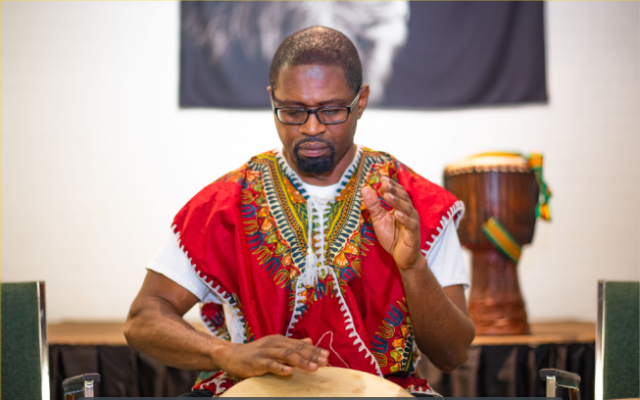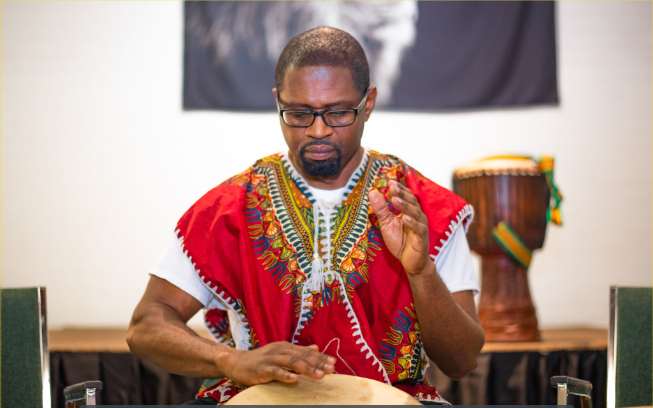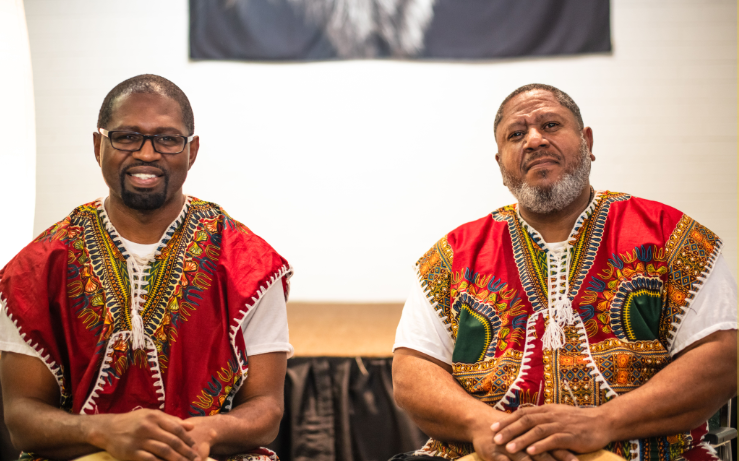
By Je’Don Holloway Talley
For the Birmingham Times
Sharing the gift of West African folklore with others is important because of how it has connected him to his roots, said Ronique Carter, 45, lead percussion instructor for the Sahi On Ko Djony West African Cultural Enrichment Program based at the Smithfield Recreation Center, near downtown Birmingham.
“What the program does for others and what this art form did for me was help to teach history,” he said. “There’s a whole lot of history that comes through the music because the ‘Djelis,’ [scribes and storytellers], are the history keepers. Anytime a new event happened, they would create music to maintain it.”
“Sahi On Ko Djony” is a Fulani term originating from the West African country of Guinea that means “The time is now.”
The Pittsburgh, Pa., native, who has been in Birmingham since 2004, has been drumming for 20 years. He got his start during his early collegiate career at Pennsylvania State University in State College, Pa., where he minored in African studies and took his first drum class. He also has studied under traditional teachers, including Abdu “Papa” Kounta, a member of the first national dance and drum company of Senegal and music director of the Thiossane Dance Company out of Columbus, Ohio.
Carter, an engineer, said that West African drumming music helps to improve academics, boost physical fitness, and build self-esteem.
“With these kids, academics is important,” he said. “I want to see their report cards. I’ve tutored them. It’s about them being their best and doing their best. It’s about encouraging them to get over any hurdles that they may have.
“Physical fitness is important, too. The [young people] are active; it’s intense [because] we can play for hours.”
Drumming also helps to raise confidence, Carter said.
“[It boosts] self-esteem and a strong understanding of self. … Some of these kids have said, ‘If it wasn’t for me doing this, I’d probably be in detention or kicked out of school. I don’t know what I’d be doing.’ … A lot of kids are insecure and don’t have a strong self-image. This definitely helps them because it’s teaching them about their history and who they are.
There are two families of drums, Carter explained: the “Dundunba,” which has three base drums played with sticks, and the “Djembe” ensemble, which is played with the hands.
Jordan Franklin, who lives in Center Point and is a ninth grader at Black Star Academy Home School Collective, is in his second year of the program and plays Djembe drum.
“I plan to stick with this for life. I don’t ever want to stop. I can’t stop,” he said. “I pretty much live to drum. I wake up and drum. … I drum so much at home that people get mad at me because I can drum all day.”
Sahi On Ko Djony has given Franklin an opportunity “that I wouldn’t get anywhere else,” he said. “I went to public school before this, and they didn’t teach us about our culture. At [the Black Star Academy Home School Collective], they teach us about our history. They brought in the drums and [group founder Edmond ‘Barry’ Johnson], and we started learning. … It opened up a lot of opportunities for me.”
Developing the discipline it takes to execute music properly is an achievement, Carter explained: “This music is very intricate and detailed, a lot more so than the music you hear on the radio. [Playing the music] teaches them discipline and work ethic that they can apply to anything, no matter what they want to do [in life].”
Those who master the music often excel in life, he added.
“People who play this music typically do very well [in life] because [they’re] using both sides of [their] brain,” Carter said. “They’re playing one rhythm with one hand and playing a whole different rhythm with another hand. It allows [people] to experience things and look at things in a greater way because they can use both sides of their brain very easily.”
Click here to read about Sahi On Ko Djony’s lead dancer and choreographer, Maria Sullivan.













